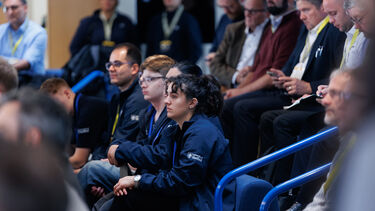Application Resources
Completing your application
When completing your application to the CDT, you should include a copy of your CV, and any academic certificates and transcripts of previous education. You will need to provide to references, of which one should be from an academic referee, or someone who can comment on your academic abilities. You should also provide a personal statement, and can use our personal statement prompts to help structure this.
Your application will be assessed against the relevant parts of our core competencies framework. You should therefore make sure that your application demonstrates a strong foundation in these areas. You can use the framework to prepare for your presentation and interview as well.
Look at our How to Apply page for more details on using the application system.
Presentation
Before your interview, you'll be asked to give a short presentation, or have a short discussion with the panel. You'll be provided with details of what this task will entail at the same time that you are invited to the interview, so you will have some time to prepare. This is an opportunity to demonstrate your enthusiasm for the project.
The presentation will be a maximum of 5 minutes, with 5 minutes afterwards for the panel to ask you questions about it. The presentation could be:
- A technical presentation on a piece of project work that you've recently completed, discussing project outcomes and problems that had to be overcome
- A presentation on the research question that you've applied for, considering how you'd approach the project and the risks and challenges you might need to overcome.
- A presentation relating to a pre-shared publication
- A non-technical presentation about a trip or visit, discussing how this might have influenced you
Interview
The presentation will be followed by 30 minutes of interview questions. You'll be asked four standard questions that assess your core competencies, and these questions will be sent to you at the same time as your invitation to interview.
A good way to prepare for these questions is to use the STAR technique (Situation/Task/Action/Result). This gives you the opportunity to describe a situation where you had to demonstrate the relevant competency, what task you had to do, how you acted, what the result was, and how you reflected on the situation as a whole.
Following these questions, you'll be asked around four questions that are specific to the project you're being interviewed for. The idea is not to catch you out! You are not expected to know everything about the project already, or there would be no point in you doing a doctorate. The specific project questions will tease out what you already know about the subject area, and may be about how you think you'd deal with a situation. These questions help your prospective supervisors to understand whether your knowledge and experience will be a good fit.
To prepare for these specific project questions, try to read some papers on the topic, look at what the industry sponsor (if applicable) does, and write down one or two examples of how you meet each of the core competencies. If you've got any knowledge of the subject area from previous research you've done, or from what you've learnt about in your degree, make sure you talk about it here.
After the Interview
Following the interview, we will not be able to tell you if you are being offered a place or not. However, we will get in touch with you as soon as possible to let you know the outcome.
Downloads & Links
The STAR Method (National Careers Service)
You can always contact us on made4manufacturing@sheffield.ac.uk if you have any questions about the application process

Kick-start your career in 2026!
Our PhD and EngD projects are now open for applications, for a September 2026 start.
